#thermidorian reaction
Text
Reminder that the 10 thermidor was only the beginning of a purge that saw hundreds of people murdered in the next two days and hundreds more arrested. Some committed suicide or were poisoned in jail.
The Commune was almost entirely purged:
there were 140 members on the general council on 9 thermidor
87 were guillotined
40 imprisoned
only 13 remained free
On 11 thermidor, twelve tumbrils carried 71 people to be executed. Here are their names. 12 more people were guillotined on 12 thermidor. Remember this when you read the traitorous CSP members tell you they did this to "prevent bloodshed" - when the execution toll on 11 thermidor was the biggest in one day ever.
Four months later in November the Club des Jacobins would be attacked by a right-wing militia led by Fréron, who broke the windows and doors down, beat the men, and stripped and whipped the women who were there. These women were ridiculed in crass pamphlets the following days. A deputy's wife was among them, whom Fréron had been personally targetting in his rag for weeks. The Convention punished no one but the Jacobins themselves by ordering the Club to be shut down and destroyed. A market was later built there and named to celebrate Thermidor.
The terrible winter came where tons of people starved because the new useless government of corrupt fiends lifted all regulations to "free" the market. This is the winter where Victor Hugo wrote Jean Valjean stealing bread to feed his sister's children. It's not a coincidence.
Less than a year later, in May 1795, the sans-culottes would rise for the last time in an insurrection that was utterly crushed and, with it, the popular spring of the Revolution.
The Revolution had been dying. It was now truly dead.
The next years were just a corpse they pretended was still alive.
138 notes
·
View notes
Text

Brount watching the Thermidor executions...
#frev#french revolution#robespierre#maximilien robespierre#fanart#art#digital art#brount#Robespierre and brount#thermidor#thermidorian reaction
83 notes
·
View notes
Text

Camille Desmoulins (March 2, 1760 - April 5, 1794)

Louis Antoine de Saint-Just (August 25, 1767 - July 28, 1794)
Some angst ridden pre-church doodles for everyone. Ghost Camille plus SJ on the scaffold.
Sorry, everyone-
#frev#french revolution#claws out for the main 5#camille desmoulins#desmoulins#louis antoine de saint just#saint just#frev art#thermidor#thermidorian reaction#the cut Camille’s hair :(#and Saint Just’s too :(
7 notes
·
View notes
Text
I've got the Thermidor blues 💔
#maximilien robespierre#oh Maxime#They’re a rotten crowd… you’re worth the whole damn bunch put together#maxime they did you wrong#thermidorian reaction#history's greatest mistakes
19 notes
·
View notes
Text
Thermidor.
#remembering#thermidor#thermidorian reaction#frev#french revolution#maximilien robespierre#louis antoine saint just#augustin robespierre#philippe françois joseph le bas#georges couthon#10 thermidor#10 thermidor year II#28 july 1794#july 28 1794
4 notes
·
View notes
Text

Implicit pro-french revolution propaganda in this story too also
#☝️🤓 she refers to the so-called 'white terror' perpetrated against ppl who had been pro-jacobins by royalist forces after the thermidorian#reaction toppled the jacobins which is ironic as one would usually see the jacobins called forces of anarchy rather than royalists#+ also note that referring to these jacobins as mountaineers is a seemingly peculiarly northern irish bad translation of their name en#francais 'les montagnards' which was derived from their sitting high up in the national convention as though they were on a mountain#literally never seen anyone but the northern star and this one 20thc academic from belfast call them mountaineers. hence this is used as#a dialect thing? sort of? ANYWAY#wip: rrl#my writing#jory.txt
1 note
·
View note
Text
It’s important to understand that the Thermidorian Reaction was not, ultimately, some deep-seated opposition to the policies of the Revolution, or some sort of conservative effort against Robespierre.
The Thermidorians did include a lot of the former Indulgents and Moderates that had been on Danton’s side (not that they were all that moderate relatively speaking), but it also included Ultras who were even more radical than Robespierre.
Like, yes, plenty of people objected to the policies of the Revolutionaries that Robespierre represented and led, this Terrorist regime, as it were, but even more, they objected to Robespierre and his seeming god complex AND
More than that
They feared being fed to Madame la Guillotine if they didn’t act.
This was not a principle objection to Robespierre and the terror, not at first, arguably not ever.
It was a principled objection to being the victims of the terror.
1 note
·
View note
Text
i asked avery what they know about robespierre (collecting data for family slides night) and they said "falsely labeled dictator, actually sensitive twink" which is strangely,,, accurate?
-sage
#see avery i posted it#also#not me literally doing my slideshow on the effects of the thermidorian reaction during and after the frev#AND TYING IT INTO LES MIS#anyways yeah#sage's bullshit
1 note
·
View note
Text
Napoleon's thoughts on Robespierre:
(some context: Napoleon never met Robespierre, but was friends with his younger brother Augustin Robespierre, who he had met while in Nice. Augustin was executed by guillotine in Thermidor 1794, alongside Robespierre and several other revolutionaries. Napoleon himself was put under house arrest during the Thermidorian Reaction because of this connection to Robespierre.)
"The Emperor, next proceeded to take a review of different point of the Revolution, dwelt particularly on Robespierre, whom he did not know, but whom he believed to be destitute of talent, energy or system. He considered him, notwithstanding, as the real scape-goat of the Revolution, sacrificed as soon as he attempted to arrest it in it's course: the common fate, he observed, of all who, before himself, (Napoleon), had ventured to take that step. The Terrorists and their doctrine survived Robespierre; and if their excesses were not continued it was because they were obliged to bow to public opinion. They threw all the blame on Robespierre; but the latter declared shortly before his death, that he was a stranger to the recent executions, and that he had not appeared in the Committees for six weeks previously. Napoleon confessed that while he was with the army of Nice, he had seen some long letters addressed by Robespierre to his brother, condemning the horrors of the Commissioners of the Convention, who, as he expressed it, were ruining the Revolution by their tyranny and atrocities."
"In the course of our conversation, relative to Robespierre, the Emperor said that he had been very well acquainted with his brother, the younger Robespierre, the representative to the Army of Italy. He said nothing against this young man, whom he had inspired with great confidence and considerable enthusiasm for his person. Previously to the 9th of Thermidor, young Robespierre being recalled by his brother, who was then secretly laying his plans, insisted on Napoleon's accompanying him to Paris. The latter experienced the greatest difficulty in ridding himself of the importunity, and at length only escaped it by requesting the interference of the General-in-chief, Dumerbion, whose entire confidence he possessed, and who represented that it was absolutely necessary he should remain where he was. "Had I followed young Robespierre," said the Emperor, "how different might have been my career! On what trivial circumstances does human fate depend!""
(source: The Memorial of Saint Helena, by Comte de Las Cases)
#napoleon#napoleon bonaparte#napoleonic#frev#french revolution#robespierre#maximilien robespierre#augustin robespierre
141 notes
·
View notes
Text
assume that if you die it's because of the political situation and not like. tuberculosis. or the numerous other more probable ways to die in the 1790s. for the sake of research.
81 notes
·
View notes
Text
Michel Biard and Marisa Linton, The French Revolution and Its Demons (2021), p. 8-16:

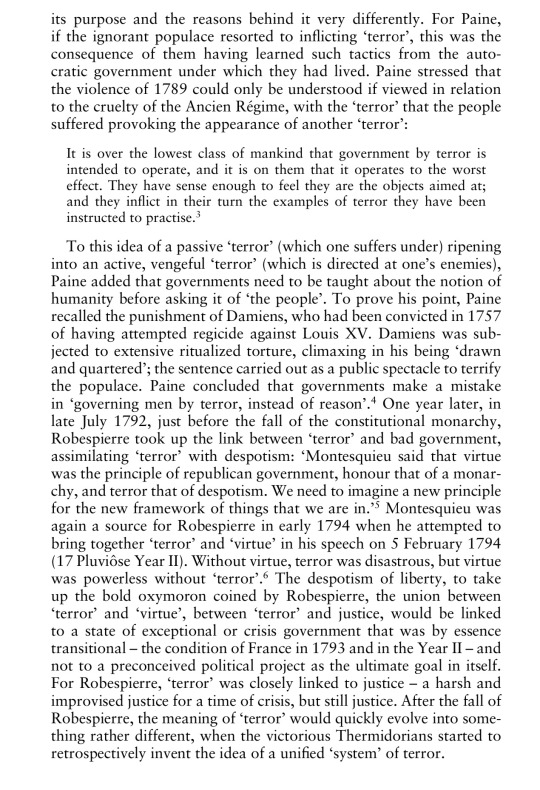



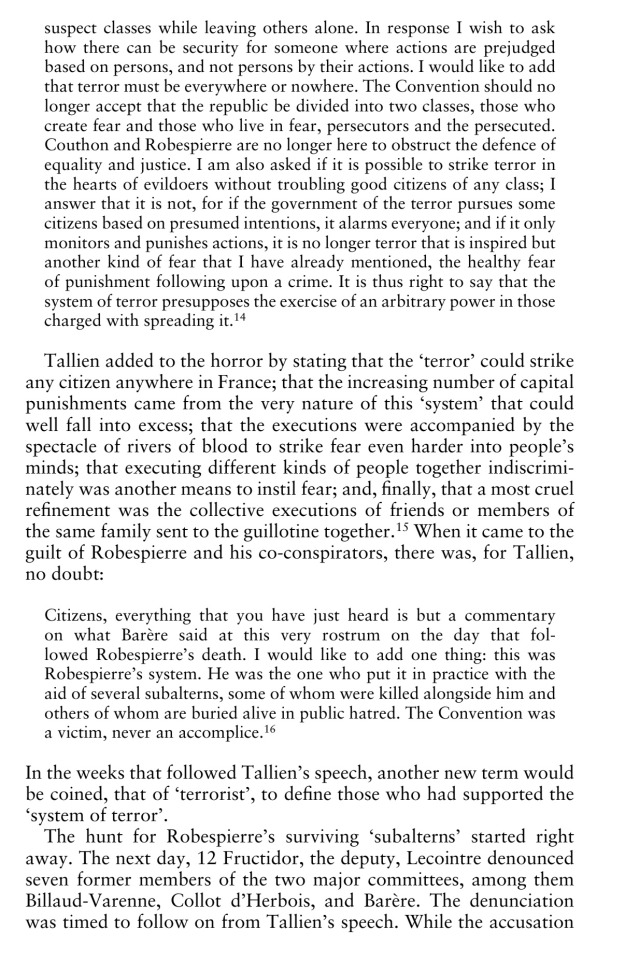
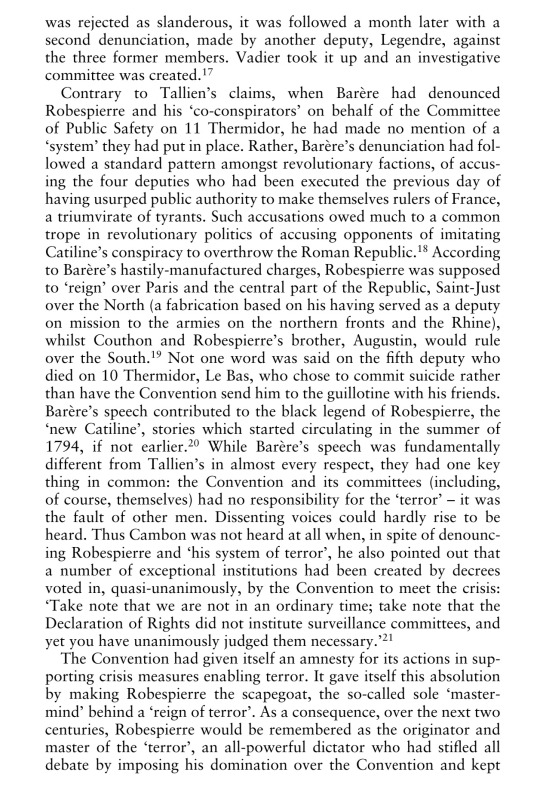


(first part)
#michel biard#marisa linton#the terror#la terreur#jean lambert tallien#robespierre's black legend#thermidorian reaction#the french revolution and its demons
75 notes
·
View notes
Text


“Maxime, have you felt well enough to take Brount out? He’s been whining at the door for some time now.”
“I am, but actually, I don’t think I’ll have time to take him out this morning before I head to the Convention. I’m sorry. Would you be able to manage on your own? Perhaps one of your siblings or one of your parents would be willing to go with you.”
“So you’re really doing it then? “You’re going to the Convention to speak. Even when the public opinion of you is uncertain.”
“Of course. The revolution is my concern. The people of France are my concern. They will act in their best interest and since I only want the best for them they won’t harm me. I promise. Besides, Antoine will be there with me. He’ll keep me safe. I’ll likely get back late, but you will see me in the morning. I promise.” At this Eleonore moved her arms and ran into Maximilien’s. He allowed himself a moment of vulnerability and buried his face in her neck, eyes squeezed shut. Eleonore was warm against his chest and her breath was hot against his cool cheek. A small, genuine smile graced his lips before he pulled back. Then, without warning, a soft hand caught him by the collar of his striped coat and tugged him forward gently. Feather light lips pressed to the corner of his.
“For luck,” was all she said, eyes wet with unshed tears.
~Excerpt from Chapter 48 of the second draft of 'The Incorruptible Corrupted'
#frev#french revolution#robespierre#maximilien robespierre#fanart#robespierre novel#frev wip#art#thermidor#thermidorian reaction#9th of Thermidor#Eléonore Duplay
15 notes
·
View notes
Note
who do you think was the most prominent yandere of the French Revolution?
finally, some real academic discussion.
Firstly, one would have to consider the definition of this term. Wiki has this to say:
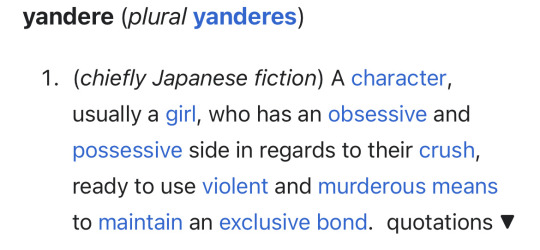
Numerous personalities of the French Revolution have been shown to have used ‘violent and murderous’ means during some point in their career, however, the causes for this vary. In order to quality as a ‘yandere’, one would have to have to have used these tactics due to their obsession with a person they admire.
(Interestingly enough, these traits may be likened to the portrayal of Saint-Just in the film ‘La Révolution Française. During the film, he is portrayed as being incredibly antagonistic towards Robespierre’s childhood friend, Desmoulins. In order to maintain his own bond with Robespierre, he employs violent tactics against him - there is a scene in which he is implied to have hired people to beat him up, and he has a huge role in his eventual execution. However, this is a fictional depiction, and fiction cannot be said to represent reality.)
With that being said, Tallien brought a knife into the Convention and threatened to stab Robespierre with it on 9 Thermidor. Additionally, he supported the executions of Robespierre and his allies. He would subsequently become heavily involved in the Thermidorian Reaction, which saw, for example, the Jacobin Club being attacked (physically).
Why would he do this? Was it his fear of being executed himself? Was it the notion that allying himself with the Thermidorians would bring him political power? Of course not! Clearly, he was a character, usually a girl, who has an obsessive and possessive side in regards to their crush, ready to use violent and murderous means to maintain an exclusive bond.
Maybe I had to stretch the definition to reach that sort of conclusion, but it’s the best I have..?
#frev#citizen card struggling#asks#sorry i took so long anon!#this was fun to answer please ask some more
31 notes
·
View notes
Text
Saint-Just's Tarpeian Rock: The First in a Series of Posts in Regard to SJ's Place in the Events of 8-10 Thermidor.
Hello all, in memoriam of the events of 8-10 Thermidor, I bring you a frantically-written piece written about Saint-Just’s place in the Robespierrest purge, where he would die at the hand of many of the ideas he helped implement.
Edit: This post is more centered around SJ's personal ideas of Thermidor, or at least what I interpret them to be from my own analyses. This isn't intended to be a comprehensive or definitive post, please be patient as I continue to develop my ideas! When I say "ideas he helped implement," that does not necessarily equate specifically to the Prairial Laws, as SJ likely didn't have much to do with those. I should have clarified a bit better about how I meant this in a broader sense, for instance - the socio-political context, i.e. the splitting of the Committee that lead to the Thermidorian Reaction in the first place. Also keep in mind that, to an extent, opinions like this are merely speculative, as we, and even professional historians, truly don't know how SJ felt during this time! I'll likely revise this post or even do a complete rewrite eventually! Thank you.
++
The bit I wish to focus on in this post is from the beginning of the speech he got out before being interrupted by Tallien during the morning session of 9 Thermidor, which he wrote the night before, unable to sleep. He sat in the Committee room, working away at his desk frantically, drafting a speech in attempt to help reconcile the Committee of Public Safety. For more information on this, see Geoffrey Bruun’s book, Saint-Just: Apostle of the Terror, starting at page 130; as well as the latter chapters of Curtis's Saint-Just: Colleague of Robespierre.
“The course of things wanted this tribune of harangues to be perhaps the Tarpeian Rock for anyone who would come to tell you that members of the government have left the road of wisdom. I believed that the truth was due to you, offered with prudence, and that one could not modestly break the commitment made with one's conscience to dare everything for the salvation of the country.”
For reference, as many people familiar with Saint-Just know, he frequently realised parallels between his own world and the Roman one he studied devoutly. This Tarpeian rock analogy tells us much about Saint-Just’s feelings in the events leading up to his untimely end.
Tarpeian Rock: common execution site in the city of Rome, reserved for traitors of the city. People were thrown off. The height of the rock (~25 meters) allowed those thrown from it to not die immediately upon impact, feeling their guilt and shame, as those in attendance watched as they plummeted to their demise.
This reference was not a mere coincidence, SJ’s classical analogies were seldom meaningless. This metaphor bears a lot of weight- both to Saint-Just, and those like me who study him. Thanks to my dear friend, who helped me come to this realisation through a very insightful discussion. Saint-Just referring to the tribunal and the lectern, specifically, as his Tarpeian rock, illustrates that he was very much aware of what was coming for both him and his colleagues. Saint-Just, probably in some ways felt this was a mere self-fulfilled prophecy. The weight of building a republic is a heavy load to bear. I think we as contemporaries often forget just how scared everyone in the Convention was. How terrified these Committee members were. The Terror had instilled a great amount of fear in these individuals, particularly people like Saint-Just and Robespierre.
Like he wrote of Marat, who he without a doubt respected, this young man also became a “victim of his own devotion.” He knew his end was near, and his firmness and devotion to the republican cause, including his colleagues, wouldn’t let him save himself. His haunting physical calmness throughout the events of 8-9 Thermidor, particularly his transportation to the Luxembourg prison (now the Conciergerie) and ride to the gallows the morning of 10 Thermidor, illustrate to us that he had at least somewhat accepted his fate. Maybe he even felt he deserved it. The crushing knowledge of knowing your dedication to the greater good would lead to your demise. Saturn indeed devoured his children during the fateful events of 9-10 Thermidor. To quote Michelet, “France’s greatest hope was lost.”
Note: Special thanks to my friend @quia-nominor--leo. Without your insight, this braindump would have never developed.
68 notes
·
View notes
Text
In the run-up to Thermidor, as a treat punishment penance Frevolutionary sort of Stations of the Cross, I'm making my way through Colin Jones's The Fall of Robespierre: 24 Hours in Revolutionary Paris. It's riveting, the way live updates on a disaster are riveting, which is to say it's agony because I know what's coming and I can neither stop it nor look away.
Anyway, this man, Jones - I'm wondering what the Frev Commune thinks of his book. I'm getting a distinct whiff of hostility towards Robespierre from him, over and above the viewpoints of the historical figures he's discussing. I accept that Jones is largely narrating witness accounts of 9 Thermidor so there's naturally going to be a certain anti-Robespierre tone to much of the book, but Jones provides meta-narrative as well and he uses a lot of gay-villain-coded language about Robespierre (he's fussy, he's thin-skinned, he's waspish, he's pedantic, he's vain, he's priggish, he's melodramatic, he's hysterical, etc etc etc). There's also a lot of Ruth Scurr-flavoured condescension, e.g. Robespierre is all talk and no action, he's pompous and self-righteous, he's hopelessly disorganised, he contributes nothing to the CPS, he's a mediocrity with delusions of grandeur, he's a controlling paranoiac and basically deserves what he's getting.
Idek guys, is this book just Thermidorian propaganda? I'm at 16:45 on the fateful day and it's so grim, but the author seems to almost enjoy it.
#maximilien robespierre#thermidorian reaction#what's the verdict lads is this book worth it?#bc it's painful to read#colin jones#the fall of robespierre
3 notes
·
View notes
Note
Hello! I hope this isn't a lazy question on my part, but I was wondering if you might have a recommendation or two on a good book re: the lead-up to the Terreur and Thermidor reaction? I've always heard of Robespierre and Saint-Just as being two horrific figures who murdered people in droves, and while it does appear the terreur yielded a lot of death, I'd love to read a more nuanced/ less sensationalized overview of the period. If you know of a book or two that cover this topic, I'd be super grateful for a rec! French or English, no preference at all. Thank you for your help!
Well I don't know a lot about Saint-Just. The only recent book I know is his biography by Antoine BOULANT.

About Robespierre :
Robespierre: la fabrication d'un mythe, BELISSA Marc.

Robespierre: la fabrication d'un monstre, MARTIN Jean-Clément.

About La Terreur (rationalizing the events) :
La Terreur, MARTIN Jean-Clément.
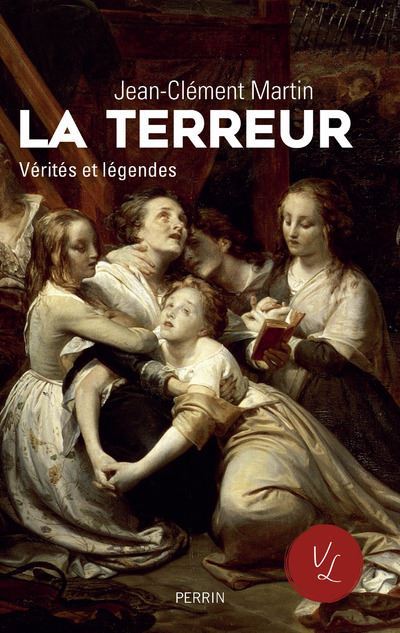
Visages de la Terreur : L'exception politique de l'an II, BIARD Michel.

Le tribunal révolutionnaire: Punir les ennemis du peuple, BOULANT Antoine.
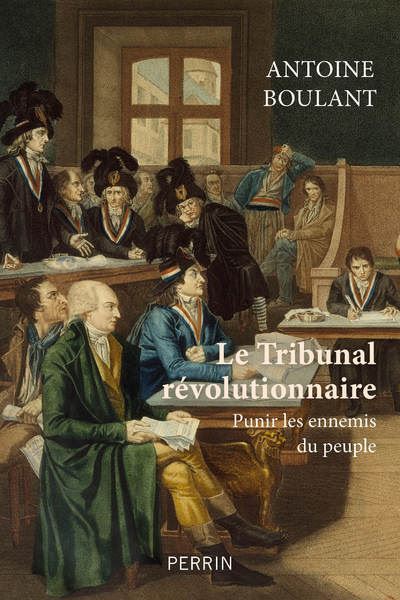
Thermidorian reaction :
En finir avec Robespierre et ses amis, BIARD Michel.
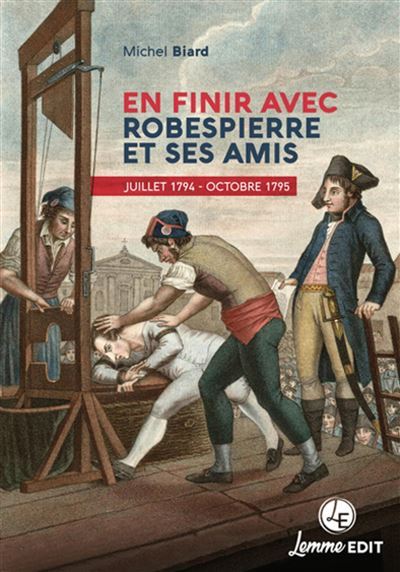
La réaction thermidorienne, MATHIEZ Albert. (It's not recent but "la fabrique" edition has a preface in which Yannick BOSC and Florence GAUTHIER put the production of the book in its original context).
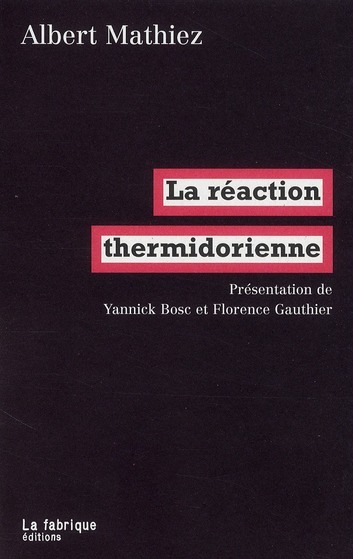
Also some Youtube videos :
youtube
youtube
youtube
27 notes
·
View notes